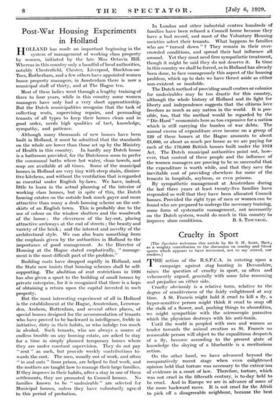Post-War Housing Experiments in Holland
HOLLAND has made an important beginning in the system of management of working class property by women, initiated by the late Miss Octavia Hill.
Whereas in this country only a handful of local authorities, notably Chesterfield, Chester, Liverpool, Stockton-on- Tees, Rotherham, and a few others have appointed women house property managers, in Amsterdam there is now a municipal staff of thirty, and at The Hague ten.
Most of these ladies went through a lengthy training of three to four years, while in this country some women managers have only had a very short apprenticeship. But the Dutch municipalities recognize that the task of collecting rents, supervising repairs, and persuading tenants of all types to keep their homes clean and in good order, needs high qualities of tact, knowledge, sympathy, and patience.
Although many thousands of new houses have been built in Holland, it must be admitted that the standards on the whole are lower than those set up by the Ministry of Health in this country. In hardly any Dutch house is a bathroom provided, for the Dutchmen seem to prefer the communal baths where hot water, clean towels, and soap are available at all times. Some of the municipal houses in Holland are very tiny with steep stairs, diminu- tive kitchens, and without the ventilation that is regarded as essential under English by-laws. We have, indeed, little to learn in the actual planning of the interior of working class houses, but in spite of this, the Dutch housing estates on the outside look much gayer and more attractive than many a drab housing scheme on the out- skirts of an English town. This is probably due to the use of colour on the window shutters and the woodwork of the house ; the cleverness of the lay-out, placing attractive archways at the end of streets ; the beauty and variety of the brick ; and the interest and novelty of the architectural style. We can also learn something from the emphasis given by the authorities in Holland to the importance of good management. As the Director of Housing at the Hague stated emphatically, "manage- ment is the most difficult part of the problem."
Building costs have dropped rapidly in Holland, and the State now insists that housing schemes shall be self- supporting. The abolition of rent restrictions in 1926 has also given a spurt to the building of small houses by private enterprise, for it is recognized that there is a hope of obtaining a return upon the capital invested in such property.
But the most interesting experiment of all in Holland is the establishment at the Hague, Amsterdam, Leeuwar- den, Arnhem, Rotterdam, and several other places, of _special houses designed for the accommodation of tenants ,who have proved to be backward in intelligence, feeble in initiative, dirty in their habits, or who indulge too much in alcohol. Such tenants, who are always a source of endless trouble on any housing estate, are asked to stay for a time in simply planned temporary homes where they are under constant supervision. They do not pay " rent " as such, but provide weekly contributions to- wards the cost. The men, usually out of work, and often "in and outs " from prison, are helped to find work, and the mothers are taught how to manage their large families. If they improve in their habits, after a stay in one of these settlements, they are promoted to Council houses. No families known to be " undesirable " are selected for Municipal houses, unless they have voluntarily agreN1 to this period of probation. In London and other industrial centres hundreds of families have been refused a- Council house because they have a bad record, and most. of the Voluntary Housing societies select their tenants. What happens to families who are "turned down " ? They remain in their over- crowded conditions, and spread their bad influence all around. Yet they most need firm sympathetic treatment, though it might be said they do not deserve it. In time in this country we shall be forced, as in Holland has already been done, to face courageously this aspect of the housing problem, which up to date we have thrust aside as either non-existent or insoluble.
The Dutch method of providing small centres or colonies for undesirables may be too drastic for this country, although the whole history of Holland and its fight for liberty and independence suggests that the citizens love freedom as much as any nation in the world. It is pos- sible, too, that the method would be regarded by the " Die-Hard " economists here as too expensive for a nation which is still carrying the burden of war debts. The annual excess of expenditure over income on a group of 120 of these houses at the Hague amounts to about £5,000, or about as much per house as we are paying for each of the 170,000 British houses built under the 1919 Act. The Dutch municipal authorities point out, how- ever, that control of these people and the influence of ,the women managers are proving to be so successful that the expenditure is worth while, and that they save the inevitable cost of providing elsewhere for some of the tenants in hospitals, asylums, or even prisons.
By sympathetic management at Amsterdam during the last three years at least twenty-five families have responded so well that they have been allocated Council houses. Provided the right type of men or women can be found who are prepared to undergo the necessary training, some form of systematic management, not necessarily on the Dutch system, would do much in this country to










































 Previous page
Previous page